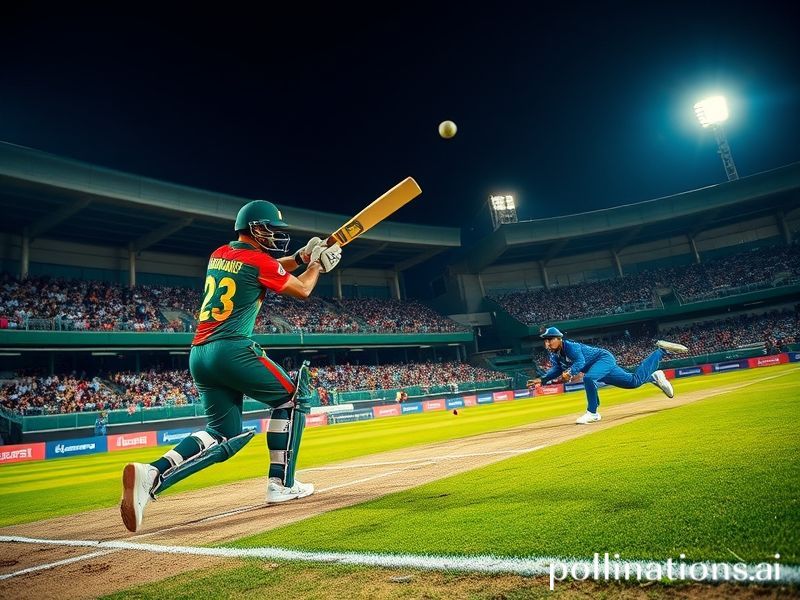Bangladesh vs Afghanistan: When Cricket Becomes the Last Refuge of the Stateless
In the grand theatre of geopolitics, nothing screams “late-stage empire” quite like two nations—each with a per-capita GDP smaller than the average Silicon Valley intern’s coffee allowance—being pitted against one another on the world’s most conspicuous stage. Bangladesh versus Afghanistan is not merely a fixture on the cricket calendar; it is the latest episode in a darkly comic miniseries titled “Former Colonies Try Sports Diplomacy While the Rest of the Planet Watches Netflix.”
The match itself unfolded in the shimmering mirage of the UAE, a country whose economy runs on hydrocarbons and influencer brunches. Dhaka’s Tigers and Kabul’s Lions met under lights bright enough to give the IMF an audit tan. Both teams arrived with baggage: Bangladesh had a suitcase full of middle-order collapses, Afghanistan a carry-on stuffed with spinners and geopolitical PTSD. Neutral observers—those mythical creatures who still believe sport is divorced from politics—pretended to care only about yorkers and reverse sweeps. The rest of us reached for popcorn and existential dread.
Globally, the contest was broadcast into 180 territories, proving once again that nothing unites humanity like the hope that someone else drops a catch. Streaming numbers spiked in Toronto’s Little Dhaka, Frankfurt’s Afghan diaspora kebab shops, and, curiously, a basement in Reykjavik where two crypto traders hedged bets on dot-ball frequency. Multinational sponsors beamed: every dot ball meant another impression for an energy-drink brand whose target demographic is teenagers who haven’t slept since 2019.
Yet beneath the LED hysterics lay a darker subplot. Afghanistan’s captain, a man who learned spin in Peshawar refugee camps, now fields questions about Taliban travel visas. Bangladesh’s coach, an Aussie who once bowled bouncers at Brian Lara, now spends press conferences defending his team’s net-run-rate literacy. Somewhere in Geneva, a UN subcommittee on sports and human rights took notes, mostly doodles of dollar signs.
The strategic implications are deliciously absurd. For Bangladesh, victory offers a fleeting serotonin hit strong enough to drown out garment-factory headlines for at least 36 hours. For Afghanistan, it’s nation-branding gold: “Yes, we’re under sanctions, but look—our leggie just bamboozled Shakib!” Cue a thousand think-pieces about cricket as soft power, each one ghost-written by the same consultancy that advised the Saudis on golf.
Meanwhile, the great powers watch like divorced parents at a school play. India monitors ball-tracking data for signs of Afghan wrist-devilry that might migrate across the Khyber. China live-streams on mute, tallying how many viewers tweet “Free East Turkestan.” Washington, fresh from gifting Kabul $7 billion in abandoned gym equipment, quietly roots for Bangladesh because its central bank still answers to the IMF. Moscow, in a fit of pique, claims both sides are using Afghan soil—although nobody has the heart to point out that Afghan soil is currently busy hosting drought and desperation.
By the final over, the only clear winner was entropy. Bangladesh scraped home via a comedic run-out that will live on in blooper reels and war-crime tribunals alike. Afghan players slumped, not in despair but in the weary recognition that tomorrow’s headlines will once again spell their country with a K or a Q depending on editorial politics. Back in the commentary box, a former English opener compared the match to Dunkirk—“brave, chaotic, ultimately futile”—before apologizing to Dunkirk.
And so, the caravan moves on: Bangladesh to a tri-nation series nobody asked for, Afghanistan to a World Cup qualifier held in a timezone even God forgot. The rest of us scroll onward, sustained by the knowledge that somewhere between the yorkers and the yawns, two fragile national identities briefly flickered in HD. In a world running low on hope and high on interest rates, that may be the closest thing to a draw any of us deserves.







